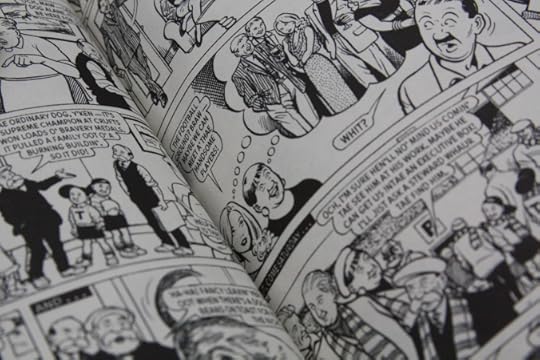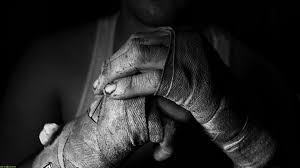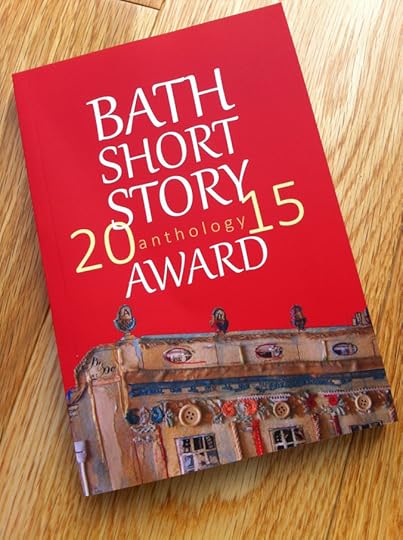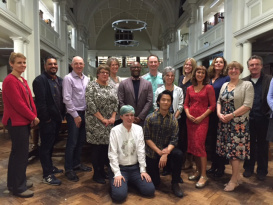Fiona Mitchell's Blog, page 10
January 28, 2016
What it’s like to finish writing a novel
There was the first draft. Then a literary agent met me and suggested changes. Next, came the second draft.
When the rejection came, I pushed the book into a drawer for a few months. Then somehow the book started niggling at me again. I found the will to push on with the third draft.
Another literary agent liked it, and what happened was this: a major rewrite and a new plot, resulting in draft number four. Cue good reactions from several literary agents, but still an all-round no.
Then one of the agents wrote back to me recommending an editor/mentor, and with her insights I’ve now completed the fifth draft. Let’s hope this draft is fabulous number five.
When Hannah Kent finished Burial Rites, she had a surprising reaction. (Admittedly this was her first draft, not her fifth).
‘I realised I no longer knew what to write. There was nothing more to write. I pushed my keyboard away from me, read the last line over and over, and then – unexpectedly – burst into tears. They weren’t tears of elation or disbelief. I was suddenly, profoundly sad.’
I can relate. Finishing feels like a loss. I’m glad that I’ve got this far, but all those obsessive late nights, all those burnt pieces of toast, all those half-listened to conversations, are gone.
I’m not sad. Neither am I elated; I just feel knackered. I’ve read my book that many times aloud that I sound like I have a forty-a-day habit. During warmer months, me speaking in my characters’ tongues has spilled through the open windows. ‘I don’t want this anymore.’ ‘It isn’t a marriage anyway!’ The neighbours must think I’ve got multiple personalities. Either that or I need a bit of marriage guidance counselling.
And I have to admit, I do feel slightly unhinged. A chapter of my life is now over. This book is just about as good as it ever will be; it’s do or die.
I’m stepping into some new place, some other writing project, something that might give me yet more oxygen. Because writing is like breathing to me: it’s the only way to live.


January 22, 2016
Do you finish books you hate?
But sometimes a book doesn’t slice my loaf – there are seven of those piled up beside my bed with an empty mug perched on top like an amateur art installation. ‘I’ll come back to you,’ I think. (I lie.)
It’s not like any of those books are rubbish, they’re just not doing it for me.
A couple of weeks ago, an editor asked me: ‘Do you read as reader or as a writer?’
And something has switched over the past year because I now read as a writer. I take notes, and analyse clues and complicated plots.
That’s turned me into even more of a quitter of books I don’t really like. I want to be inspired after all. Reading has become study. Rather than watching a magician do tricks, I’m leaning over to the side, having a good old nosey at where she’s stuffed her ace of clubs.
But I could learn something from my bedside pile. Just what is it that’s not working for me? Is the main character too much of a snooty toff to identify with? Or is it that the plot is too slow, the characters too passive?
Pressing on with a book that makes you groan for all the wrong reasons can pay dividends. I gave up with We Need to Talk About Kevin 100 pages in, but I returned to it a year later, and what a punch-to-the-gut read it was. Similarly, I toiled over the opening chapters of The Narrow Road to the Deep North, but stuck with Dorrigo Evans to the bitter, beautiful end.
I had to exercise patience with both books, and boy was it worth it. I felt, I believed. Someone salsa-ed inside my ribcage.
So – oh go on then – I’m going back to my bedside pile.
What kind of reader are you – a quitter or a plough-on-until-the-ender?


January 15, 2016
How to start writing a novel
Some writers start off with a massive sheet of paper, scribbled with charts and graphs. They jot down just what’s going to happen from the very first page to the turning point, right through to the climax and beyond.
If that sounds like you, you might be writing a plot-driven novel. And I envy you – your destination might be miles away, but you can see it there like a landmark in the tiny distance.
If you just scribble down rough ideas for characters that’ll leap into the murky situations you create for them, you might just find yourself in the territory of the character-led novel.
‘You have a character-driven novel,’ an editor recently told me. ‘So the plot depends on how each character evolves.’
When I started writing The Maid’s Room, I had three characters in mind. I jotted down a couple of key events, read a few text books about how to write a novel then blundered my way through. Even though the book got placed in a competition, that first draft was pretty amateurish. There were enough self-conscious phrases to leave you moaning in pain.
But I wasn’t giving up on it – I knew I had strong characters, so I tinkered, and edited, titivated and rewrote. Then finally a renowned literary agent gave me a good talking to. She loved so much about the book, but the plot was just so flipping depressing. Well, it certainly wasn’t going anywhere the way it was, so I decided to rewrite it.
That’s when I went down the graphs route. My friend, Lucy, thought she was taking me out for a birthday lunch. Instead, I unravelled my A3 sheet of paper complete with columns and arrows, capital letters and conclusions. Lucy managed to look interested. The characters would remain the same, the setting too, but there was a new plot for them all to fall into.
I started writing, knowing what was going to happen, and it did. It was just the characters got a bit distracted along the way. Next, another agent referred me to an editor who’s now keeping me on the straight and narrow.
So I started off a free-flower and have ended up a plotter.
With book two, I think I’d feel safer having a plan, but until you get to know your characters, how can you work out what they’re going to do? Which means I’ll probably head down the same route – create characters, put them into awkward situations then see how they react.
This piece was inspired by a post by author Claire Fuller.


January 11, 2016
A Writer’s Day on a Plate
TOAST
Stick the bread in the toaster. It’ll take at least a minute, so you might as well use the time wisely, right? Smash the keys and peer at the screen. And then smell the stench of burn. But what’s a charred piece of Kingsmill when you’ve cracked another line? Frisbee the blackened square into the bin and pop another slice in.
Now, you’ve figured out the timing, it’ll be browned to perfection. Carry on typing. The fire alarm goes off next, so you fan that new notebook under it, and figure it’s best to concentrate on one thing at a time.

SNACKS
The end of a paragraph? You’ve hit 500 words? Any excuse to celebrate – cut a slice of cake, butter that muffin. You deserve it right?
And might as well kill two birds with one stone. Scoff it in front of your keyboard and type. Only thing is the space bar’s now jammed with crumbs, so tip your laptop upside down and give it a good old shake. Nope, it’s still not working. Time to bring out the big guns. You wet a J-cloth and give the entire keypad a once over. The screen’s flashing, the mouse is dashing around like a frenzied fly.
Call it quits for the day and visit your nearest Apple store.
QUICK AS YOU LIKE DINNER
What a palaver dinner is. The most time-consuming meal of them all. You take everything out on the food, cutting those carrots like you hate them. Flinging the rice into the pan to bring to the boil. And as for any protein…..oh, just stick it under the grill. All this preparation means you’re going to have to leave your computer alone. Except you don’t.
You end up with the rice grouted to the pan and the carrots boiled to buggery. Looks like you’ll have to make do with toast only there isn’t any bread left since you burnt it all.
There’s always the freezer. So that’s where that garlic naan that you froze in 2009 went to.
Still if your cupboard is bare, it gives you more time for writing.


January 3, 2016
New Novel Resolutions: Things I’ll never do again
But here are the three biggies, things I’m going to try hard not to repeat. I’d already been told these were no-nos, it’s just I chose to ignore the advice. Well not any more.
I’m turning myself into an advice sponge. I’m going to lap it up like a ladyfinger.

1 Burn the Patois
God, I love Trainspotting. Brought up on a diet of Ayes and Help my Bobs, via The Broons and Oor Wullie, I throw in the old colloquials whenever I can. Well, that’s alright in dialogue, but the whole narrative? An editor from a major publishing company who gave me some fantastic advice a fortnight ago expressed a preference for bog standard English. Okay, so I know some writers do experimental narrative well, but it’s not working for my book. ‘The patois creates a distance between the character and reader,’ one literary agent told me. So adios, patois. Laters. Kapitche.
2. Make sure your characters have an arc
My characters are distinct – that’s one thing that all the agents who’ve read my book have agreed on. It’s just one of my characters has no internal arc. In my head, she was a put-upon angry young thing who’d eventually transform into a formidable business woman. On my computer screen, however, this character was as flat as a chapati with breeze blocks piled on top. Your characters need to change. They need a turning point in which they start to act differently. List the changes. Write them down, pin them to your wall. Your characters need to grow.
3. Start in the right place
My central character, the one that has the sharpest edges and spikiest tongue, her story doesn’t really get going until page 70. Cue major edit. Your character’s story needs to start on page one. There has to be an inciting incident to tip your reader into the narrative. It needs to be powerful enough to keep your reader turning the pages. Magnetize them. Draw them in. To do this, create conflict straightaway, things that are at stake.
So this is it. I’m going in. Here comes my first edit of 2016. And this time my novel’s going to be patois-free, bursting with provocative beginnings. No flatlining allowed.


December 22, 2015
The number one mistake NOT to make when submitting to literary agents

So I finish the novel (for the *ahem* fourth time) and send it back to the agent who read the book once and told me that the concept was brilliant and that she loved my writing, but that changes were needed.
She replies. And there it is, that sting, ‘another agent might feel differently.’ Cue re-reading the email four more times (ok, let’s be honest, it was 10 times, analysing it word by word like Jacques flipping Derrida). It’s definitely a no then….
But this time I was so sure it was ready. The characters had sharp edges and bulgy bits. They smiled; they did the whole dramatic thing better than Sofia Helin. (Okay, so no one does it quite like her.) But they’re good people and I blooming love them, and so do my friends.
I pull off the Kleenex that I’ve Sellotaped to my cheekbones to mop up the tears, and get on with the day job. Besides it’s not that bad; other agents have requested the full novel too. Surely one of those will be The One.
Each of them replies and gives detailed feedback. (One sends me a standard rejection letter, but that’s a small detail.) All of them agree – I need to streamline the narrative; it needs more pace.
One of them suggests an editor. But hang on a minute, I had it edited two years ago, 700 quids worth of edits, I can’t keep throwing money at a project that might never see the light of day, can I?
Something persuades me, some deep belief that this book is beginning to be more than half-decent. Perhaps it just needs a little bit of help. After all, it’s a very different book to the one it was two years ago when it was shortlisted in a competition run by literary consultancy Cornerstones. I contact the agent who’s suggested an edit and she puts me in touch with a trusted editor – a specialist in narrative structure.
The editor reads the book in two days and hacks away at the narrative like it was one of those overgrown lavender bushes in my neglected back garden. Right there in the centre is the bones of the thing, all tangled up in subplot. The pace has been slowed by it, the main drive has been strangled.
Then something magical happens. The editor invites me to meet up. She tells me she likes the book really quite a lot. She agrees to be my mentor while I finish it.
Writing a book is a massive investment – your time, your sanity (occasionally) – but if you really believe you have something that could be good, it’s worth shelling out for an editor. It’s a false economy not to, I reckon. I’d become so embroiled in my novel that I just couldn’t see its faults.
So I may not be finishing the year with a literary agent, but I’m not on my own anymore. I’ve found a mentor who’s in my corner. And, this wannabe debut novelist is back in the ring.



December 4, 2015
The Weekend Read – A Short Story
I’m feeling smiley today; my short story The Colour of Mud is The Weekend Read on the For Books’ Sake website which champions women’s writing. Read the rest of the story or listen to the podcast by clicking on the links.

The Colour of Mud
I am never gonna be clean, even though I wipe myself down seventeen times a night. It’s the mud, see.
I pull my scarf around my face and jump puddles alongside the wall of trucks, grey ones, black ones, all blanketed by the dirt.
There are three men playing poker at a table they’ve set up in the middle of the drag. A standing man, his leg bent up on a chair, blows a tuneless harmonica. A jar on a table beside him is scabbed with ash.
I step forward and the mud sucks my leg down knee-deep. I grunt and slurp it out.
The lights of a bar flash on and off: The Good Times Saloon, the scaffolding on the roof a kind of skeleton. An open kitchen fogs oil and fried plantain. Further up the drag, the cooking mixes with the night stench. Petrol, tobacco, skin slicked in sweat.
There are echoes of laughter and the underfoot beat from a song on the radio.
I pass an island of scorched grass and stare down searching for remarkable signs of green. There’s no such thing as colour in this non-existent town. It’s not on no map, but the truckers know just where it is, halfway along the Western stretch of the Nakuru-Eldoret highway.
Read the The Colour of Mud


December 2, 2015
What NOT to Do When A Literary Agent asks for your Whole Novel

Who wouldn’t be excited when a literary agent asks for a full manuscript? It’s likely to send you into a proof-reading frenzy (comma overdose,,,,,) your fingers wobbling over the keyboard as you finally hit Send. Then just after you do, you’ll spot a typo.
Things go oh-so-quiet after all that frenetic activity. And you wait, your imagination looping UP – the next time the phone rings, it’ll be her – and then whoosh – DOWN – If she rejects me, I’m never going to get another chance like this, never.
It’s going to be a nail-chewing, neck-tensing, grumpy-mood-inducing time, so here’s some tips:
1. Don’t start monitoring the literary agent.
Googling her name, looking up other people who she’s offered representation to. Sound familiar? Force yourself to look away from the screen, and stop logging onto Twitter every five minutes to see if she’s posted. Put your energy into starting something new. A short story. A new novel. Read or collect ideas for future work.
2. Don’t bombard the agent with emails.
Coo-ee, just wondering how you’re getting on with The Masterpiece? Then two days later: Me again. And, don’t phone. That’s the equivalent of repeatedly ding-donging someone’s doorbell when all the lights are on, but no one’s opening up. Reading a full takes time. Some agents take about three months to reply to an initial submission of three chapters and a synopsis, so how long is it going to take to read your 90,000 words? A few weeks ago I read an account by a published author that went something like this. I wrote to a literary agent and 24 hours later she offered me representation. Two days after that, she negotiated me a three book deal with Penguin. I lay my head on the desk and almost muttered the words, I’m unworthy. I ate a scone instead. Thing is, it doesn’t happen like that for most writers. Exercise patience, distract yourself, keep writing. Agents who’ve requested a full can take anything from one month to six to reply.
3. If an agent who requested a full hasn’t replied after three months, do email and say you’d welcome some feedback.
Sometimes when an agent requests a full they don’t reply at all. Yep, this happened to me with an early version of my first book. It’s happened to other writers I know too. Try not to take it personally, it’s more of a reflection on the agent than on your writing. So there!
4.When the agent turns your book down with feedback, don’t do anything apart from flaring your nostrils and swearing.
Don’t bash out an instant reply. ‘Thanks for your patronising comments, but…’ Step away. Go for a run. Punch that pillow. A rejection usually comes with pointers. ‘The narrative wasn’t taut enough,’ for instance. ‘The plot lost direction halfway through.’ File the email somewhere other than in your inbox, so it’s not staring out at you for the next few miserable mornings as your damp cornflakes slap onto your keyboard. When you’ve calmed down, read the email again, process it and adjust your manuscript accordingly. Send it to an editor too – you might think that’s a waste of money, but the fact that anyone has requested your full means that there’s some magic to it. An editor could be just the genie you need.

5. When the reply doesn’t contain any feedback, write back saying you’d welcome some.
Most agents will be more than happy to give you their thoughts. Don’t expect compliments. Do expect constructive criticism.
6. When an agent reads a full, and asks for a second read once you’ve made changes, definitely send it back to her.
Once you’ve made changes, you could send out more submissions too – to up to eight agents at a time – after all, by the time your MS has risen to the top of the slush pile, your almost-agent might have signed or rejected you anyway. Alternatively, you could stop sending your book out. But remember, this is limbo land – an exciting yet anxiety-ridden place. Do whatever feels right for you. But whatever you do, eat scones, don’t cyber- stalk, and keep writing.


November 17, 2015
How to Stay Sane When Submitting Your Novel
Recently literary agent Juliet Mushens suggested in a Tweet that it’s a good idea to submit to eight to ten agents at a time rather than blanket submitting. Brilliant advice, I reckon. If your book’s got some kind of magic to it, you might just get some agent feedback. Even if the book gets rejected, you could still come away more clued-up about what’s not right with it, bruised ego aside. You might then choose to rework it before submitting to other agents.
A few months ago, I got a request for the full manuscript of my second book. Ultimately the agent turned it down saying she didn’t find the characters likeable enough and she wasn’t sure what was driving the story. I’ve stopped sending it out and am halfway through a rewrite. I think the characters are more sympathetic now, with meatier back stories; I might just have a better book on my hands.

That brings me back to my first book. I had some encouraging agent interest in it two months ago and ended up rewriting it. The book is stronger now and I’ve sent the first three chapters to several agents. So here’s how to hold onto your sanity while waiting for a reply.
1. Don’t refresh your email account every five minutes.
Turn it off. Turn off social media too. Do not allow yourself to look at the Twitter accounts of the eight agents on your list. God, she’s reading Goddamn Marlon James when she should be reading my MS…. Look away. Log off. Go and do something less boring instead.
2. Don’t be tempted to send out to more than ten agents at a time.
Remember, you might just learn something. So you’ve written the whole thing in patois and the agent who loved your concept absolutely hated the Gads instead of Gods, the me sandals instead of my sandals. Okay, admittedly there might be those of you who love that kind of thang (sic), but if more than one agent says it doesn’t work, it could be time to take notice. If after the first few submissions, you learn two things about how to improve your book, you’ll be well pleased you didn’t do multiple submissions.
3. Do not delete the rejection emails.
Your lips may bulge with that silent F, so let them, but do not let your fingers smash that delete box. It’s very useful to keep a log of who’s rejected you. That doesn’t mean you can’t contact them again when the book is better, or when you’ve penned your second masterpiece. And just because you’ve got a rejection from one person at a big agency doesn’t mean to say someone else at that agency won’t fall in love with your writing. Also, think about how much fun it’s going to be counting up all those rejection letters when you’re finally published. Yeah, put that in your pipe and smoke it, Mrs/Mr ‘I’m going to pass….’
4. When an agent asks to see the full manuscript, don’t stand in front of the mirror practising what you’re going to say if she/he offers you representation.
‘I’d just like to thank my husband for his attention to apostrophes, my friend Jill who was there from the start….’ Waste of time! Chances are you might have a long wait for representation, so instead of risking your family banging on the bathroom door – ‘Is everything alright in there?’ – just get back to writing, or reading, or thinking up new ideas. Preferably all three.
5. Do not put your writing on hold.
If anything write more. Discarding all of the above, this is one thing I have managed to do. I’ve always got a short story on the go. Just write something, anything, write rubbish then rework it, edit it, perfect it. For me, short stories silence the self-doubt. I love them. They’re a rejection letter quick fix. So keeeeeeep writing!

6. Do not burn your book.
So you’ve now got 30 rejections in the bag, but don’t start carping. ‘That’s it, I’m finished.’ Last year an agent who I met at a literary event talked about how a novelist’s first novel often becomes her second or third published novel. And since I know a couple of best-selling authors, I can vouch for that. Keep searching for ideas, maybe even start book two. Keep trying. Things can only get better, right?


October 11, 2015
Bristol Short Story Prize Awards Ceremony – The Lowdown
It was my second time at the Bristol Short Story Prize awards ceremony last night. I was hopeful; I was in with a chance after all, among 20 other writers chosen from almost 2,500 entries.
There they were, faces I recognized from last year, organiser Joe Melia, judges Sara Davies and Sanjida O’Connell, and wasn’t that 2013 winner Paul McMichael over there? He’d made the shortlist again. I made a beeline for him and we began laughing in a slightly hysterical, scared kind of way. Still the fear was nothing on last year when – gulp – I could barely speak my mouth was that dry.

Bristol Short Story Prize Writers and Judges
Us shortlistees sat in the front row in the glass-topped Reading Room at Bristol Central Library. And judge Sara Davies read out the names of the runners-up. Mine was among them.
I hadn’t won.
But so what – my story is in a book again – words that I’ve fussed over, changed and rearranged. A story that the early readers and the judges must have connected with somehow. It gets a mention in Sara Davies’ foreword.
‘We all liked….the restrained and powerful exploration of an illegal immigrant’s emotional trauma at the heart of Black Lines,’ she writes.
It was a good feeling reading that. I hope other readers connect with my story too.

Anthologies galore….
Massive congratulations to Brent van Staalduinen whose story A Week on the Water won first prize, and to the other prizewinners too.
After the ceremony, I spoke to the other shortlisted writers, smiles stretched across their faces, bags bulging with anthologies. (They make very good Christmas presents, let me tell you.) Wine was drunk, woes were shared and successes were well and truly celebrated. I even signed a few books.
It was great to bend Joe Melia’s ear again. His encouragement last year helped steer me through a bout of writing self-doubt. When that strikes again, all I need to do is open up my brand new anthology and remind myself of the rewards for not being a quitter.
Joe also told me that no one in the history of the Bristol Short Story Prize has ever managed a hat trick, so maybe, just maybe I’ll throw my hat into the ring again next year.
https://www.bristolprize.co.uk/shop/





